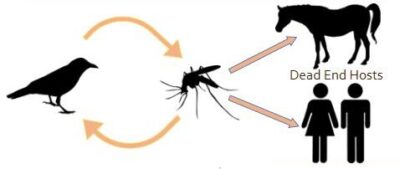
A catch basin in Saint Paul, MN, a common breeding habitat for Culex mosquitoes, the carriers of WNV.
West Nile Virus
West Nile Virus (WNV) is the most common mosquito-borne disease found in Minnesota. The primary disease-carrying species are Culex pipiens, Culex restuans, and Culex tarsalis. MMCD works closely with the Minnesota Department of Health to monitor cases of WNV in Minnesota.

The West Nile Virus transmission cycle.
WNV normally cycles among birds and mosquitoes. The virus circulates in the blood of birds for a few days after infection. Mosquitoes acquire the virus when they feed on infected birds. Infected mosquitoes can then transmit West Nile virus to humans and animals through their bites. The virus is injected from the mosquito’s salivary glands into the blood stream where it can multiply and cause illness. Humans and animals are considered "dead end hosts" because the virus cannot be further transmitted once it reaches these hosts.
All residents of areas where West Nile virus activity has been identified and all visitors to those areas are at risk of West Nile virus infection. People who are over the age of 50 are at greatest risk of developing severe illness after exposure to West Nile virus. infection with West Nile virus is rare and 805 of people infected experience no symptoms of illness.
Symptoms and Prevention of West Nile Virus
Most WNV infections are mild, symptoms include fever, headache, and body aches, occasionally with a skin rash and swollen lymph glands. More severe infection may be marked by headache, high fever, neck stiffness, stupor, disorientation, tremors, convulsions, muscle weakness, paralysis, coma, and in 10% to 15% of severe cases, death. Only 1 out of 150 people infected with WNV develop a serious illness.
What should I do if I think I have West Nile Virus?
Prevention of West Nile encephalitis and interruption of West Nile virus transmission is most effectively accomplished through integrated vector management programs like those employed by MMCD. MMCD is working closely with the Minnesota Department of Health to detect and control West Nile virus. This includes surveillance for West Nile virus activity in mosquitoes, birds, horses, other animals, and humans. Also important are implementation of appropriate mosquito control measures to reduce mosquito populations and public notification efforts. MMCD provides mosquito control services in the seven county metropolitan area and we work with MDH to keep the public informed of the current West Nile virus situation.
Below are some tips for avoiding mosquito bites:
- Stay indoors at dawn and dusk when most mosquitoes are active.
- Wear loose-fitting long-sleeved shirts and long pants whenever you are outdoors.
- Apply an EPA-registered insect repellent to exposed skin.
- Remove any water-holding containers from your property, as they can produce mosquitoes.


